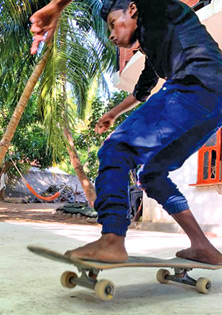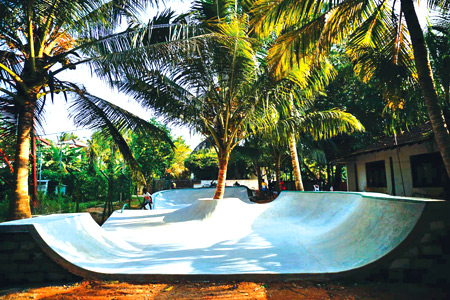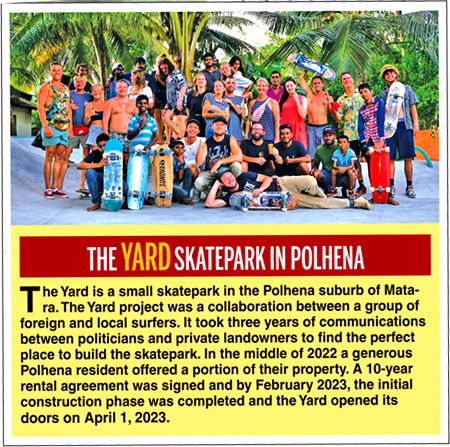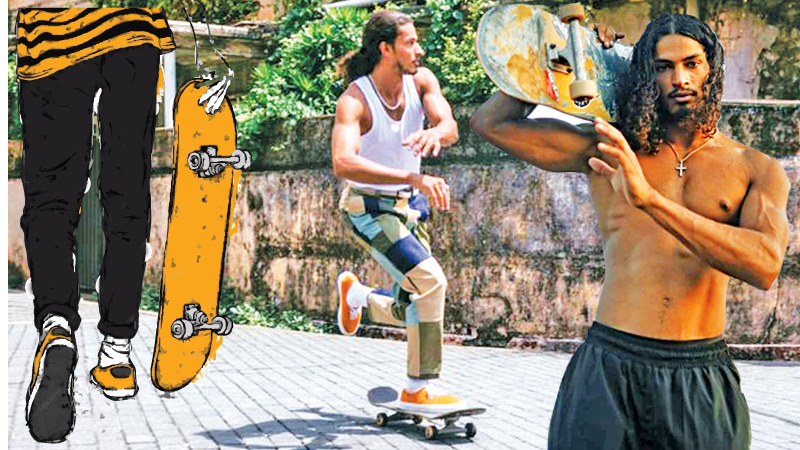Surfing is the most popular form of extreme sport in Sri Lanka. Thanks to the country’s ideal, year-round waves, small fishing hamlets like Ahangama, Midigama, Weligama, Mirissa, Polhena and Arugam Bay have transformed into tourist hotspots frequented by surfers from all parts of the globe.
 And just like skateboarding’s genesis in California surf scene in the late 1950s, skating in Sri Lanka is slowly emerging out of the Down South surfing community. If you visit Ahangama, Midigma and Polhena today, you’d find skatebowls and half-pipes at hotels, hostels and restaurants.
And just like skateboarding’s genesis in California surf scene in the late 1950s, skating in Sri Lanka is slowly emerging out of the Down South surfing community. If you visit Ahangama, Midigma and Polhena today, you’d find skatebowls and half-pipes at hotels, hostels and restaurants.
Although skating had a local presence before its advent Down South, most skateboarding happened around Colombo and skaters didn’t have proper infrastructure like ramps and half-pipes etc. Given the lack of space and proper equipment, the few loose skating communities in and around Colombo faded out as quickly as they came.
Manu Dharmaraja is an extreme sportsman, model and master of ceremonies who have been a part of the Colombo skate scene during its tiny emergence in the 2010s and the Down South surfing and skating scenes. Manu started Skate for Sri Lanka right before Covid as a mission to popularise skating among local youth, especially those from underprivileged communities.
We spoke with Manu recently and asked how Skate for Sri Lanka is making a difference.
Q: Can you share the inspiration behind starting Skate for Sri Lanka and what motivated you to promote skateboarding in the country?
A: My hero Tony Hawk and Rodney Mullen, the guy who created the kickflip, are my main inspirations. I used to always watch their videos including Eric Koston’s. And then I watched a TED talk by the founder of Skatistan Oliver Percovich; this guy just rocked up to a war-torn country with one skateboard and literally created a revolution.
Literally skateboarding is the largest sport for women and girls in Afghanistan because there wasn’t a separation and identity created though this as a sport for boys or for girls. So parents were confused. They didn’t have the time to really make the decision to make the girls stay home and then they realised that their children are going to a safe space. I was inspired by that because we’ve been going through a lot of issues in Sri Lanka for many generations now. So I thought our people, especially the younger generation, need some sort of influence and different gateways to get out of that closed minded thinking and figure out how to express themselves. That’s where my inspiration came from.

The Yard after it’s first construction phase
Even as a kid I stayed out of drugs and when I was 14-15 I and four or five of my friends just wanted to skateboard and it literally took us to a whole another level, so then I was like “Yeah Skate for Sri Lanka. Let’s start something!”
Q: What efforts are being made through Skate for Sri Lanka to engage with local communities and encourage participation in skateboarding especially among the youth?
A: My target is the local community, especially those who are underprivileged. I don’t have a distinction. I wouldn’t say like “Hey you’re not underprivileged I won’t teach you”. I started Down South at the Bad Cobra in Midigama. I had a few students and then the Arugam Bay season happened and I had 70 students overnight. I would teach them on a flat ground stage but the stage was broken, there was chipping and whatnot but just having that little space and so many kids were so inspirational.
Almost every single kid from the village joined. I just rocked up with four skateboards and spoke to these two kids. It was a local football match between foreigners and locals and I asked one of them, “Do you surf?” and he was like, “Yeah”. And I was like, “You skateboard?” And he was like, “I’ve tried it a few times, some foreigners had a board” and I was like, “you wanna learn?” They were super excited about it. So I was like, “Okay, how about this. Tomorrow 4pm bring your friends. If y’all come here, I’ll buy you guys ice cream”. And these kids brought the entire village the next day. It was overwhelming. But I felt like this is definitely something that can be massive if done the right way. Ideally if we can get solid investors or funding and support, it could be an islandwide thing you know. Like it doesn’t only have to be seasonal, we can provide it to them all the time and turn it into school like Skatistan.
Skatistan has four different branches, I think the Afghanistan one is closed now because of the Taliban. But they have ones in Cambodia, Bangladesh and in South Africa. They have other locations, but it’s also a school. To provide alternative education like this is my dream.
Q: What are your challenges and how do you plan to address them?
 A: The main challenges have always been funding, equipment, including safety gear, boards, coaches, and locations. Sri Lanka still doesn’t have a fully established skate park.
A: The main challenges have always been funding, equipment, including safety gear, boards, coaches, and locations. Sri Lanka still doesn’t have a fully established skate park.
My goal is to build skate parks all over Sri Lanka at some point, that’s why I went to India last year and joined my friends there. I have friends who have built 30 skate parks in India so far and have learned the mechanics about it and I’ve told them to get involved. Right now it’s just really about figuring out the funding because GoFundMe doesn’t work in Sri Lanka but there are some other platforms, and I want to make it foolproof.
Apart from that there have been minor challenges, like for instance there have been very few run-ins with the cops. It’s a new sport, they don’t understand it, they think you’re out, I mean, skateboarding has that rap; skate in public and you’re going to damage property, or you’re going to hurt someone or something like that.
I think that happened in Colombo. I’ve experienced it thousands of times and now it’s my favourite thing. I would get stopped by cops and I would literally, in front of them, take my skateboard and I would ride it straight at them. And like they’d be like stopping a car. And then I would stop in front of them and then I would literally, because I studied political science in the US, which was my degree, my bachelors. So I know my law, still learning more about Sri Lankan law. But with skateboarding, it is not even in the Constitution, it doesn’t mention that this is illegal, that you can’t skate, that they can put you in jail or can fine you, nothing like that. So every time something like this comes up, I list all out to them and I’m like, “If you do want to take me to a cop, we can. Like, you know, but you might get fired, my brother”.
So I’m very open about them with this and I try to explain them in the nicest possible manner, saying, hey, this is what it’s about. You know, we’re trying to keep kids out of drugs. We’re trying to have fun here. We’re not trying to disrupt, you know, environments. If a cop is bothering a skateboarder, just imagine, he’s probably missing out on catching someone else committing a crime, an actual crime.
For instance, in Arugam Bay, this cop was like, “Oh, but if you’re skating on the road, if something happens to you, like a car hit you. What do I do about it?” Maybe they’re concerned in that manner. But like at the end of the day, it’s my decision, you know. If I choose to do this and because there’s no actual safe place for us to skate, you know, we’ll keep doing it here. Skateboarders are adrenaline seekers at the end of the day.
Q: Are there any collaborations or partnerships with local organisations, businesses or government initiatives?
A: There are actually a lot of collaborations that I can’t necessarily speak about; very big ones, things that are still in the works. But I would say one of the biggest shoe brands in the world that also exists in Sri Lanka and provide to, well, most, how do you call it, most locals. Because in Sri Lanka, we still don’t have an official skate shoe that has been made. I know FOA has tried to make some shoes, but it’s not a skate shoe.
So that’s my dream, to make a skate shoe for the local community that’s affordable and the ones that you get here are fake. So they’re not doing one-to-ones. Like, you know, they’re fake. So to be a better skater, you need to have the good ones. If you play basketball or cricket or whatnot, you get fake products and you could probably, like, break your foot. Like, you never know. Like, the bubble in a shoe might burst or something, you know.
There’s a company called WeSkateCo/WeBuildCo. These are the people in India that I met and did construction with. They’re one of the only skate companies in India, very linked to all the main skateboarding brands, like factories. I’m working with them to be a merchandiser as well and sell skate equipment in Sri Lanka. I know Onda does it, but in my opinion… It’s too expensive. I want to, locally also, make my own boards and bring down a few other brands.
Skateistan have been speaking to me since the day I started and gave me advice. Whenever I need advice I go up to them. They have this initiative called Good Push Initiative. You go on their website and it’s amazing. They literally have layouts. And they have templates on all kinds of things like education on how to start a social skateboarding organisation. It’s just there for free. Apart from that SkateAid is also a skateboarding organisation I met. I made contact with the guy who runs SkateAid in Nepal. I believe he started in Germany. Not too sure. But they have many branches also in Africa and developing countries like Bangladesh. I also have plans to go up to Nepal and meet them and work with them. Sri Lanka is the main place that we want to create this contact. But I have to also leave to make these connections and bring them back here and help them out. Because everyone needs skateboarding in their life, I would say. But so far, for collabs, that’s been it.
There are some clothing companies that definitely want to collab with me. There is a streetwear brand. So, we will hopefully launch with boards, t-shirt, pants, skate accessories. I was sponsored by Push Skateboards back in the day. Me, Aaron and Nicola were like the main three skateboarders for them. That was the first local skate company in Sri Lanka. Well, I suppose that didn’t necessarily work out. To be quite frank, to have a good skate company, you need good skateboarders to promote you. When I was younger we used to go to festivals like Electric Peacock and skate for them.

Manu’s students in Arugam Bay
In order to build skaters you need really good skateboarders around so I’m also going start a YouTube channel because that’s how I learned how to skateboard. I used to look up tricks on YouTube channels and I would like practice. Right now I’m one of the best skaters here in Sri Lanka and there were a few young guys around but they also went abroad. So I’m getting back into it again so getting my treflips together.
Pix: Manu Dharmaraja, Alex, Polly & the Yard






